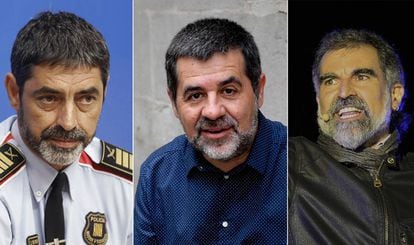Catalan police leader under investigation for sedition by High Court
The force will try to prove that it complied with the orders of prosecutors and judges

Spanish High Court (Audiencia Nacional) judge Carmen Lamela has cited Josep Lluís Trapero, the leader of the Catalan police force, the Mossos d’Esquadra, as one of the people being investigated for sedition following the incident in Barcelona on September 20, where thousands of protesters tried to block the actions of Spanish National Police and Civil Guard officers who were charged with preventing the illegal referendum in the region.

The Catalan police report that they must attend the High Court to demonstrate that they have complied with the orders from the judges and the prosecutor’s office, reports Rebeca Carranco.
The judge cited as subjects of investigation other people including Teresa Laplana, responsible for the Catalan police in the Eixample neighborhood of Barcelona, the president of the Catalan National Assembly (ANC) Jordi Sánchez, and Jordi Cuixart, president of the Òmnium cultural language association. They must all attend court hearings accompanied by their lawyer.
The crime of sedition comes with a punishment of up to 15 years in prison
Shortly afterward, Sánchez said the Spanish state had “definitively gone mad” and he was weighing up whether or not he would attend the court hearing.
In Spain, the crime of sedition carries a punishment of up to 15 years in prison for those who are found guilty of “a public and tumultuous uprising” in order to “prevent the application of the laws, either by force or outside the legal channels.” It is also sedition to “prevent any authority, official corporation or public servant from carrying out the legitimate exercise of their duties.”
Some 40,000 people protested and staged riots that day against Operation Anubis, where 14 people, including a number of high-ranking officials of the Catalan regional government were arrested for preparing the referendum. According to the prosecution’s complaint, the protesters “punctured the wheels of several Civil Guard patrol cars that were parked in front of the economy department, in order to prevent their legitimate action,” and “ANC volunteers,” who were “aware that this would make it difficult for police intervention,” cordoned off the door to the department, “to prevent the Civil Guard from taking the detainees” that day. “The protesters threatened the Civil Guard with the chant of ‘you will not leave’,” the complaint reads.
The protesters threatened the Civil Guard with the chant of “you will not leave”
Jordi Sánchez told the protesters “not to go home, it will be a long and intense night,” the complaint states. “Before the situation of extreme tension,” the letter reads, the Court of Instruction No. 13 contacted Trapero to order him to deploy his police force to facilitate the exit of the officials, who “had to leave at dawn through the roof of the building, because protesters prevented their exit through the door.”
Jordi Cuixart later asked that “the mobilization not stop,” said the complaint, while three official Civil Guard vehicles “were attacked by the crowd, forcing the agents to take refuge in the Treasury building while they destroyed three official vehicles.”
English version by Debora Almeida.












































